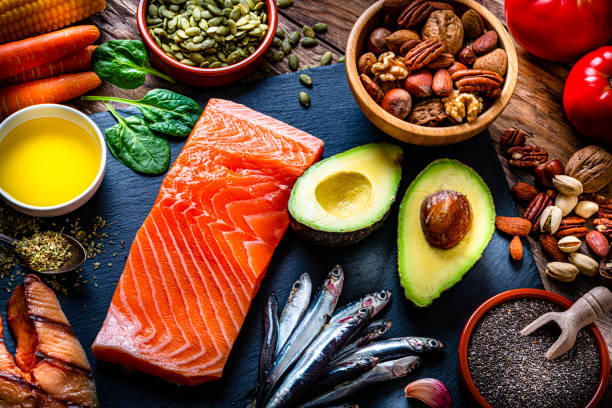The Mediterranean diet for longevity stands out for its focus on plant-based foods, whole grains, beans, seeds, and nuts, all drizzled with extra-virgin olive oil. Unlike other diets, it rarely includes butter and limits sugar and refined foods. Red meat is used sparingly, while healthy, oily fish rich in omega-3 fatty acids are encouraged.
A groundbreaking study followed over 25,000 women for 25 years. It found that those who adhered closely to the Mediterranean diet had a 23% lower risk of early death. Furthermore, they had a 17% reduced risk of dying from cancer and a 20% lower risk of cardiovascular disease. Dr. Samia Mora, a cardiologist, highlighted that this dietary pattern could significantly reduce mortality risk over a quarter of a century.
Key Components of the Mediterranean Diet
Emphasis on Natural Foods

Image from iStock
The diet’s simplicity and focus on natural, unprocessed foods make it effective. Here’s what it involves:
- Fruits and Vegetables: These should make up the majority of your meals. Think vibrant salads and hearty vegetable stews.
- Whole Grains: Include brown rice, whole wheat pasta, and barley.
- Beans and Seeds: These are fantastic sources of protein and fibre.
- Extra-Virgin Olive Oil: This is your go-to fat source.
- Fish and Seafood: Aim to eat these at least twice a week.
- Limited Red Meat: Use red meat sparingly, mainly to add flavour.
- Moderate Dairy: Include small amounts of cheese and yogurt.
The Mediterranean Diet and Women’s Health
Why is the Mediterranean diet particularly beneficial for women? It helps reduce the risk of breast cancer, dementia, and depression. Women’s bodies metabolise food and medicines differently than men’s, affecting their health outcomes. For instance, women have different heart attack symptoms and process alcohol and medications uniquely. This diet’s focus on natural, nutrient-dense foods supports women’s specific health needs.
How to Start the Mediterranean Diet

Image from iStock
Starting the Mediterranean diet for longevity is easier than you might think. Here are some simple steps to get you started:
Increase Vegetables and Legumes
Begin by adding more vegetables and legumes to your meals. Aim for a variety of colours and types to ensure a broad range of nutrients.
Choose Whole Grains
Swap out refined grains for whole grains. Whole wheat bread, brown rice, and quinoa are excellent choices.
Use Olive Oil
Make extra-virgin olive oil your primary fat source. It’s not only healthy but also adds a delicious flavour to your dishes.
Eat More Fish and Seafood
Incorporate fish or seafood into your meals at least twice a week. They are rich in essential omega-3 fatty acids.
Limit Red Meat
Cut back on red meat. When you do use it, let it be a minor part of the dish rather than the main feature.
Enjoy Dairy in Moderation
Include moderate amounts of cheese and yogurt. They can be a delicious part of your diet without overindulging.
Reduce Sweets
Save sweets for special occasions. Satisfy your sweet tooth with fresh or frozen fruit instead.
Takeaway
The Mediterranean diet for longevity is a simple, sustainable way to improve your health and extend your life. By focusing on natural, wholesome foods and making small, manageable changes, you can enjoy the benefits of this diet. So why not start today? Add more vegetables, whole grains, and healthy fats to your meals. Your body—and your future self—will thank you.
ALSO READ:
Keys to Long Life: Your Guide to a Healthier Journey
109-year-old woman’s secret to long life is avoiding men
Nurturing Health and Longevity: Life Expectancy in Singapore
 Together Against RSV
Together Against RSV SG60
SG60 Pregnancy
Pregnancy Parenting
Parenting Child
Child Feeding & Nutrition
Feeding & Nutrition Education
Education Lifestyle
Lifestyle Events
Events Holiday Hub
Holiday Hub Aptamil
Aptamil TAP Recommends
TAP Recommends Shopping
Shopping Press Releases
Press Releases Project Sidekicks
Project Sidekicks Community
Community Advertise With Us
Advertise With Us Contact Us
Contact Us VIP
VIP Rewards
Rewards VIP Parents
VIP Parents
